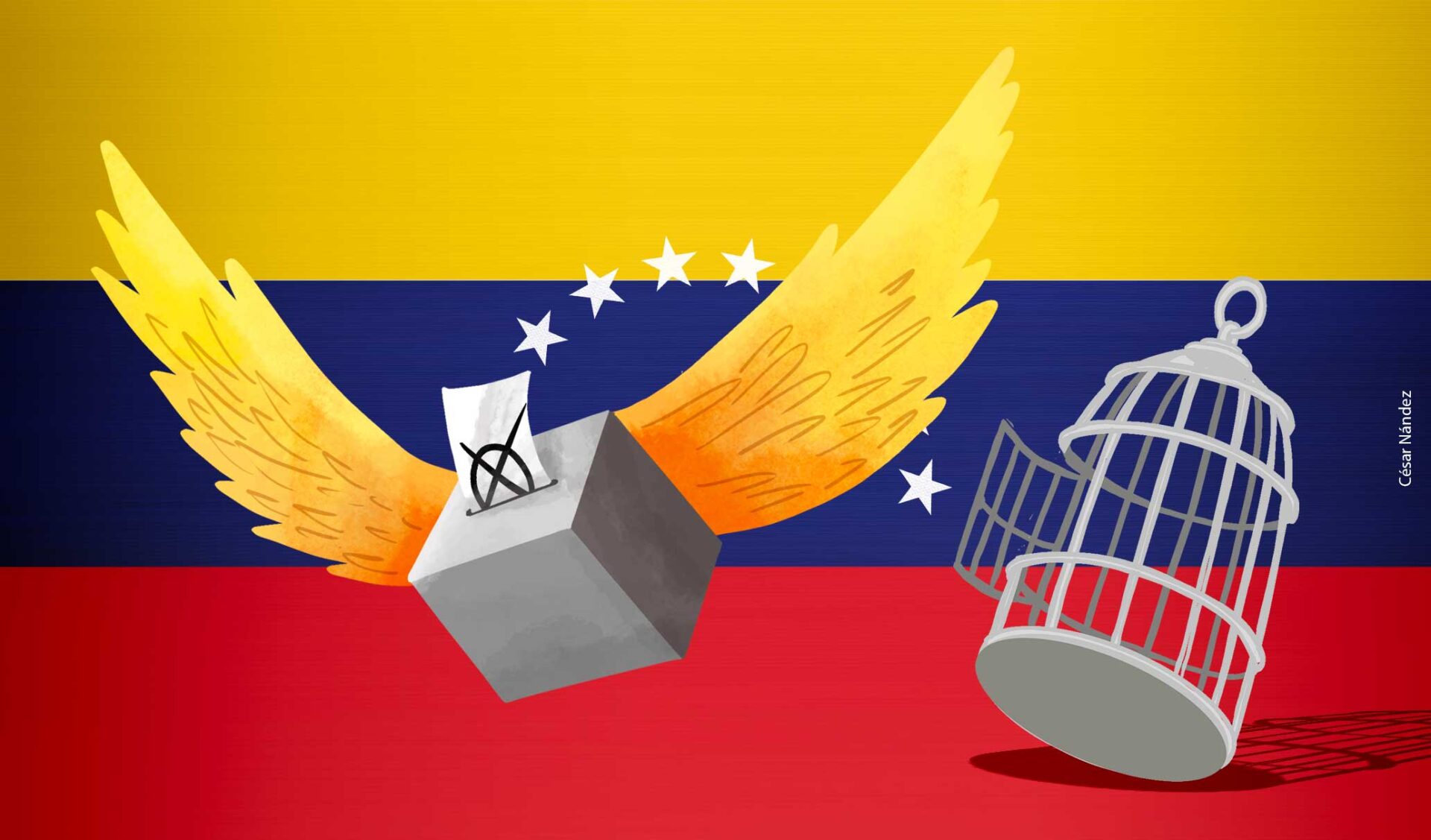A few days before the presidential election in Venezuela, the political situation in the country is becoming increasingly tense. On the one hand, the government of Nicolás Maduro continues with authoritarian practices aimed at preventing the desire for change from being genuinely expressed at the ballot box. On the other hand, the opposition led by María Corina Machado and the candidate of the Plataforma Unitaria Democratic (former Mesa de la Unidad Democrática), Edmundo González Urrutia, continues touring the country and concentrating tens of thousands of people in cities and towns throughout the country, despite the obstacles and restrictions imposed by different pro-government actors. In the midst of the competing groups, Venezuelan society is increasingly showing its desire for political change in a peaceful and electoral manner.
Although the 2024 presidential election in Venezuela is shaping up to be the least competitive in the country’s recent history due to government advantageous position, electoral malpractices, abuses, and persecution towards the candidacy of the Democratic Unitary Platform, there is a real possibility that the opposition will obtain more votes than the government. The 2024 election is marked by the maintenance of the opposition’s participation strategy after the results obtained in the 2021 regional elections. At that time, the opposition grouped in the Plataforma Unitaria Democrática (former Mesa de la Unidad Democrática) abandoned the strategy of electoral boycott and decided to nominate candidates to compete for mayorships and governorships (mainly Un Nuevo Tiempo, Primero Justicia, Acción Democrática). This decision was not exempt from criticism and internal tensions, Leopoldo López’s party, Voluntad Popular, in the voice of former deputy Juan Guaidó, “interim government president”, called citizens to demonstrate to demand fair elections:
“The call to Venezuelans is to go out to the streets, to demand free and fair elections, to go out to the streets to protest for what is wrong, to choose in an election, the one they owe us and the one that originated this crisis and to promote a national salvation agreement.”
From outside the Plataforma Unitaria, María Corina Machado, leader of Vente Venezuela, argued that there were no conditions for a free and fair election, and labeled the leaders seeking popularly elected positions as “roommates”. In fact, she criticized the European Union for sending observers, since, from her perspective: “This does not help the democratic struggle of the Venezuelan people, but rather the permanence of the regime”. At that time, she maintained the thesis of the credible threat whose objective was to pressure the government externally to negotiate its exit from power.
Additionally, the opposition that participated was fragmented. On the one hand, the parties of the Plataforma Unitaria managed to coordinate for the presentation of joint candidates. On the other hand, the parties that had participated (Avanzada Progresista, Cambiemos, etc.) in 2018 and 2020, as well as the judicialized factions of the parties of the former MUD, built the so-called Alianza Democrática, as they sought to substitute electorally the opposition of the Plataforma Unitaria.
In any case, as we demonstrated in a study together with Maryhen Jimenez, Stefania Vitale and Guillermo Tell Aveledo, the outcome of the 2021 regional elections showed the importance of elections for social and political mobilization. The overall result was that the opposition parties together obtained more than four and a half million votes, 55 %), while the PSUV alliance obtained 45 % of the votes. But given the fragmentation, the superiority of votes did not translate into more governorships or mayoralties for the opposition. However, the potential of the opposition was there and this, from a certain perspective, possibly marked the change in Machado’s position.
The 2021 election improved the international image of the government as it allowed the participation of the opposition (the MUD card, prevented from running since 2018, had been legalized), disqualifications of opposition leaders were lifted, the opposition was allowed to have two out of five main rectors in the CNE and the European Union was invited as an international observer.
For these elections, the Maduro government speculated that the opposition would maintain its previous strategy, and if the elections were held in the same manner as in 2021, its goal of staying in power without resorting to further repression or outright fraud would allow it to remain in power and demand the lifting of international sanctions. However, as the election has been approaching, the miscalculation has become evident.
A change of strategy for 2024
First, in this campaign, despite its important internal differences, the opposition managed to solve, through the primary election, the problem of selecting its presidential candidate. In May 2022, the Plataforma Unitaria called for a primary election in 2023, which would be organized by independent personalities, academics and civil society organizations.
The primary election represented a coordination challenge among the opposition and, toward the end of the campaign, the struggles between the different candidates seemed to lead to the failure of the process. In addition, the opposition had to endure constant threats of suspension or intervention by the government through the judiciary.
Despite this, the primary election obtained a higher than expected turnout and an overwhelming victory of María Corina Machado with 92% of the preferences of the approximately two million voters who participated. With this result, Machado claimed the right to lead the opposition and to personalize the leadership of the opposition.
Secondly, the government estimated that if it blocked Machado’s participation, she would not tolerate it and would take the path of electoral boycott, of which she had been a promoter since before 2015. On the one hand, it did not lift her political disqualification fabricated by the Comptroller General and ratified by the Supreme Court of Justice. On the other hand, it prevented, without legal cause, the nomination of Professor Corina Yoris as Machado’s substitute.
The slogan “until the end” and statements made by Machado’s immediate surroundings seemed to indicate that without her on the ballot the opposition would remain on the electoral road. However, the slogan contained an ambiguity that hinted at the possibility of continuing, despite the obstacles.
After a negotiation between Machado and Manuel Rosales (Governor of Zulia, leader of UNT), it was defined that Edmundo Gonzalez Urrutia (registered to reserve the postulation of the MUD card) would be the presidential candidate. This decision to maintain participation in the elections, even with worse electoral integrity conditions than the previous presidential elections, has led the government to increase repression and persecution of leaders, activists and citizens supporting or providing services to Machado and Gonzalez Urrutia’s tours.
Between October and June, several regional leaders of Vente Venezuela have been arrested, Machado’s team was accused of terrorism and some of them were imprisoned and others had to seek asylum in embassies. Businesses that have provided services to Machado or Gonzalez Urrutia have been closed and fined, and owners of public or private transportation that have transported the candidate or Machado have been arrested. All these acts of intimidation and repression have marked the period before the campaign and its beginning.
Additionally, the CNE has suffered an important deterioration in the way of making decisions where opacity and discretionality reign. In August 2023, Elvis Amoroso, who was previously the Comptroller of the Republic and responsible for the political disqualifications without trial of opposition leaders such as Capriles Radonski, Leopoldo López and María Corina Machado, among others, was chosen to preside the CNE. Thus, the relatively moderate CNE in 2021 is currently almost completely loyal to the government so that minimum procedures of transparency, fairness and electoral integrity are hardly complied with.
What do the polls say?
The few known reliable polls report widespread discontent toward the Maduro government. According to Latinobarómetro 2023, 32.6% “approve” of the government’s management, while 67.3% “do not approve”. While firms such as Consultores 21 and Delphos give González Urrutia as the winner with preferences close to 50%.
Although the data must be taken cautiously, the demoscopic exercises show the rejection to the government and an electoral preference towards the MUD candidate. However, the truth is that there are external conditions that may inhibit people from expressing their real preferences or be coerced by pro-government agents to change them at the time of voting. After all, the Venezuelan election takes place in a non-democratic context, in which there are mechanisms of social control by the government over part of the public employees or beneficiaries of social programs.
The pro-government campaign
The Government’s electoral campaign has been ineffective in showing a positive message due to the lack of achievements and the logical wear and tear of a 10-year government that has caused the most serious humanitarian emergency in the country’s history. In this context, any promise is perceived as an act of cynicism. On the other hand, the message of fear, “us or chaos”, does not seem to make a dent in the electorate either.
What is certain is that Machado’s victory in the primaries and the endorsement of her support to Gonzalez Urrutia has managed to regroup the dissatisfied Chavista sectors. However, within the ranks of the ruling party there are also pressures and repression. An example of this was the judicialization of the Communist Party of Venezuela, historical partner of the PSUV since 1999, which has given its support to the candidate, Enrique Márquez de Centrados.
In any case, the result of the election is not closed. If we consider the non-democratic context in which the election is framed, the government’s capacity for electoral manipulation remains ample. For example, changes in the way voters are distributed in the voting centers allow the government to exercise greater control over the voters at the voting tables. Another technique is the previously used one of changing the rules for party table witnesses a few days before the closing of the CNE registration.
In summary, the selection of Maria Corina Machado as candidate in the opposition primaries and her insistence to remain through Edmundo Gonzalez Urrutia in the electoral route has polarized the 2024 presidential election. Currently, there are only two real contenders, each representing diametrically opposed visions of Venezuelan society and who do not recognize each other.
Although Machado seems to have the majority of preferences, the institutional control of the government and the possible manipulation before and during the election are crucial factors that could close the gap or even give a narrow victory to Maduro. Nor can it be ruled out that, if necessary, the government may openly change the result at the end of Election Day.
The consequences of a possible non-recognition of the election results could open the door to greater ungovernability, as well as an intensification of the migration crisis in the region. Therefore, these results will not only affect the future of Venezuelans, but also that of neighboring countries, whose capacity to manage the Venezuelan migration crisis is limited and causes internal tensions.













